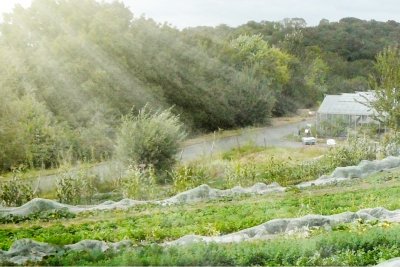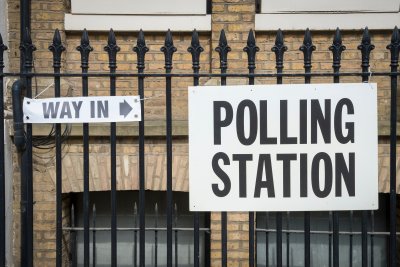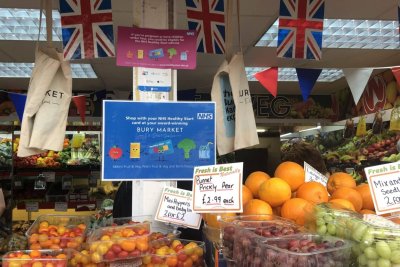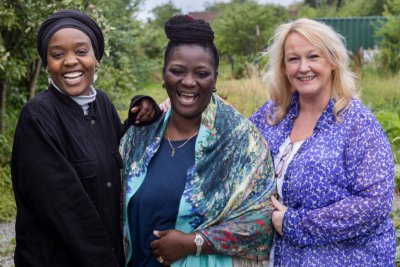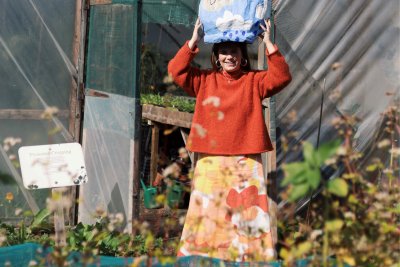Six approaches to Bridge the Gap
With input from a range of people active in food and farming, Bridging the Gap have alighted on six areas of focus to explore. Here Kiloran O’Leary walks us through them.
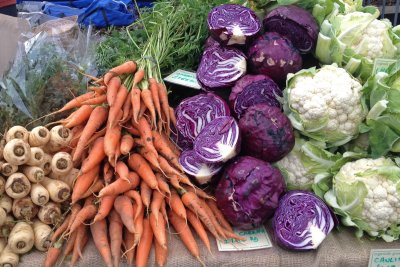
Bridging the gap (so that food that is good for the planet is affordable for everyone) is a huge task with many routes to get there, from relatively quick wins to radical transformations.
The vision of the programme has always been to explore a package of policies and financial interventions that could both stimulate more climate and nature friendly food production AND increase the capacity of those on lower incomes to afford climate and nature friendly food.
Following intensive coproduction, we have prioritised six areas, which will be familiar to many of us, and therefore have years of advocacy and campaigning behind them. Our challenge is now to test their impact on the ground, build a suite of policy demands and agree a narrative to help us bridge the gap as a movement.
1. Enhancing public sector food procurement
Put simply, this is a focus on food that is bought by public institutions using public money; think schools, hospitals and council run care homes. Sustain and its alliance of food sector organisations have been campaigning for public institutions to invest the public’s money in food for public good. The potential for better health and environmental outcomes is huge given that £2.4 billion is spent purchasing food and catering services by public institutions every year.
And we know it can work! Take Denmark where the ‘Organic Action Plan’ with a target of 60% organic fruit and veg in public kitchens since 2020, has brought about change. They have funded farmers to transition to organic horticulture and provided support for kitchen staff. And closer to home in 2022 Food Senses Wales seized an opportunity to join a group of schools, an organic grower and a wholesaler for a pilot project supplying one organic vegetable, courgettes, into 29 schools. The government backed priority to have Welsh produce in Welsh schools combined with a procurement contract coming up for renewal allowed for this pilot intervention to move forward. The Courgette Pilot Report has gained the interest of Welsh government who are funding a further expansive trial this summer.
"It will take a sustainable supply chain investment scheme that specifically targets the gap between cheapest available veg and sustainably produced Welsh veg” (Courgette Pilot Report).
Our work is to show why it is important to bridge the price gap between conventionally produced fruit and veg, for example organic, and quantify the benefits this brings. The Courgette Pilot report calculated that the cost of purchasing organic courgettes over conventional was 56% higher. The case therefore needs to be built that the public good of change is imperative if we are to meet our health, social and environmental commitments.
2. Investing in food hubs and wholesaler supply chains
The term ‘food hubs’ is used widely and there are conflicting understandings of what it means. Here, and in Bridging the Gap, we understand food hubs as:
Small and medium-sized enterprises that buy from local farmers and sell to local retailers and hospitality businesses. They can take on supply chain roles, such as sorting, packing, and distribution. The difference with ‘traditional’ wholesale is that they are built on strong ethical and sustainable values.
In May, Sustain and an alliance of organisations called on DEFRA to support a £5million food hub fund. Why? Because shorter and more efficient supply chains, that are farmer-focused, can help ensure farmers get fair returns. They can be more diverse and resilient and better able to withstand global and domestic shocks, while rewarding climate and nature friendly farming that will provide security over the longer-term. Furthermore, food hubs allow food producers alternatives to abusive contracts with larger supermarkets.
Examples in the UK include Open Food Network an open source software designed for food producers and community food hubs. In the south west is the Tamar Valley Food Hub who are one of the co-founders of OFN in the UK. The Better Food Shed, our partner Growing Communities’ wholesale arm, is a London-based supplier of fresh, organic, locally sourced fruit and vegetables. While Organic North are the largest organic wholesaler in the north of England, supplying several Better Food Traders in the region.
Developing resilient food hubs is a complex area; for one, there is no supply without demand. There is also the challenge of how this food can be affordable for those on lower incomes, and how we can, through innovation and investment, bridge this gap, which we will be exploring in our pilots. Gathering the evidence and making the case for food hubs infrastructure and support we believe is a key route to create a food system that is fair to both producer and customer.
3. Building access through local retail
Even if climate and nature friendly food was more affordable, if there are no grocers or retailers selling this fruit and veg, we still won’t achieve our mission. Traditional fruit and veg markets and high streets are in decline and we know issues around access don’t just relate to the price gap. Food access is also about availability where people live and we cannot rely on supermarkets with their drive for lower prices, at the expense of the supply chains and the environment. We need diversity and choice for consumers.
Sustain are creating a Growth Plan for Local Food within the retail sector. It aims to secure a minimum of 10% grocery retail market share for local food by 2030. To take this further Bridging the Gap want to explore how a pilot initiative could support local retailers, such as street markets, to offer climate and nature friendly food where people on low incomes live.
We want to show how local food retail can feel relevant to people from all walks of life, to see it as the hub of community, a place of meaningful work and a system that circulates wealth locally. The case for shorter supply chains via food hubs and ethical wholesalers must go alongside a thriving local food economy that offers people from all incomes a planet-friendly food offer.
4. Advocating for voucher schemes and fruit and veg on prescription
Healthy Start is an NHS scheme that helps women who are pregnant or have young children and are receiving benefits, buy foods such as milk or fruit and veg. Programme partners, Alexandra Rose Charity (ARC) provide Rose Vouchers to families, with a wider eligibility criterion than Healthy Start. These kinds of voucher schemes help young families access more fresh fruit and vegetables but with a relatively low value, and rising food prices, they do not really enable purchase of organic fruit and vegetables. There has also been recent media coverage of Healthy Start’s low uptake and Sustain’s support for autoenrollment and we believe there is more opportunity here.
Adapting and extending a government food subsidy scheme, such as Healthy Start, could be a relatively quick win. We will explore how our pilots can make the case for Healthy Start’s value to increase and be ringfenced for organic fruit and vegetables from local suppliers.
Included in this theme are other voucher-based approaches, such as a fruit and veg on prescription trial that ARC are involved in, based at the Bromley by Bow Healthy Living centre, funded by Tower Hamlets Council. In Lambeth, the project works with AT Beacon a local community health organisation, with funding from Lambeth Council Public Health Team. Here vouchers are given to participants identified by NHS-funded social prescribing staff and could provide a key opportunity for those on lower incomes to receive access to organic veg, sourced through local supply chains that build community wealth. Watch this space…
5. Recognising the value of horticulture
The horticulture sector gets little public money; on average £3900 in payments compared to an average of £28,400 for ‘all-type’ farms. A horticulture strategy would bring gains for public health, for the environment and nature with more diverse and sustainably grown produce, for good jobs and enterprise in new businesses.
Despite the need, the horticulture strategy was suddenly dropped by the government in May and Sustain’s Head of Farming, Vicki Hird responded saying "This is an appalling, backwards step given the huge need for coherent and cross departmental action on production and consumption of sustainable fruit and vegetables.”
And what about culturally appropriate food? The cost of importing fruit and vegetables that aren’t typically grown, but are central to many people’s cuisine culture, in the UK has risen dramatically. An example of the cost of living crisis combined with climate crisis negatively affecting diverse communities. Growing vegetables such as okra local to communities who regularly cook it could have a combined benefit of minimising food miles, lowering price and even diversifying UK grown crops to adapt to climate change.
As well as support for existing horticulture farmers, we need support for new entrants and farmers making the transition and more education routes. Organic farming accounts for 3% of total land use in the UK and an even smaller percentage is horticultural. This theme will be further explored to see where a pilot could showcase the huge opportunity in horticulture to bridge the gap.
6. Championing a Real Living Wage in farming and beyond
We need fairness throughout the system and a real living wage on both sides of the gap; the producer getting a fair price for their product and buying power for the eater. Sustain’s report Unpicking Food Prices shows that farmers receive less than 1% of profits if supplying a supermarket chain. Producers supplying Better Food Traders, on the other hand, get a fairer price.
We need the food and farming movement to join those calling for a real living wage throughout the system and beyond, that empower people to make the right choices and to live out their values when they shop and eat and support farmers to do the right thing for climate and nature.
What’s next?
The task now is to show how we stimulate supply and demand in the food system and ensure a fair price for the consumer and for the producer. As we pilot interventions this year that model and link with local and national policy opportunities, we want to show how these policies and financial incentives can increase demand by making the food more accessible, harness economies of scale and simplify and enhance processing and distribution. Ultimately, we will be collectively crafting these six building blocks to bridge the gap so that food that is good for the planet is affordable and accessible for all.
If you would like to get involved in our policy and advocacy group, or you would like to share anything you are doing relating to these six areas contact bridgingthegap@sustainweb.org
Read our recent blog on coproduction or delve into why we have focused the programme on price
Published Monday 10 July 2023
Bridging the Gap: Bridging the Gap to climate and nature friendly food for all.
